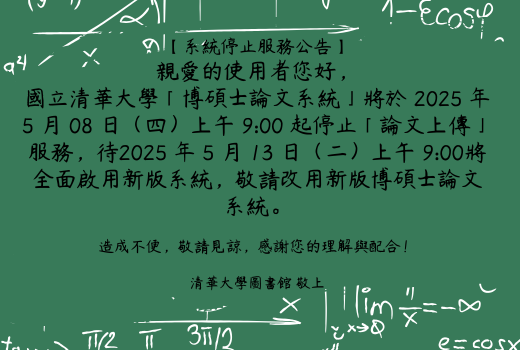|
參 考 文 獻
壹、 中文部分
中時電子報網站(2014)。「無私真愛」問卷調查。2014年9月 23日,取自http://www.chinatimes.com/realtimenews/20140923004321-260405
古婷菊 (2006)。國中教師幸福感及其相關因素之研究(未出版之碩士論文)。國立臺灣師範大學,臺北市。
阮懷萱(2014)。彰化縣公立國小教師主觀幸福感、學校組織氣氛及教師組織承諾之關係研究(未出版之碩士論文)。國立彰化師範大學,彰化縣。
李志明(2015)。臺中市國民中學校長正向領導與行政人員工作績效之相關研究(未出版之碩士論文)。國立彰化師範大學教育研究所,彰化縣。
李連成 (2012)。新北市國小兼任行政人員角色壓力、幸福感與組織承諾關係之研究(未出版之碩士論文)。國立政治大學,臺北市。
余德成(1996)。品質管理人性面系統因素對工作績效之影響(未出版之博士論文)。國立中山大學企業管理研究所,高雄市。
吳清山(1992)。學校行政。臺北市:心理。
吳清山(2012)。為教育建構幸福而努力。國家教育研究院電子報,34。2015年4月5日,取自http://epaper.naer.edu.tw/index.php?edm_no=34&content_no=900
吳清基(1999)。教育與行政。臺北市:師大書苑。
吳清基(2001)。學校行政新論。臺北市:師大書苑。
吳朝舜(2006)。國民小學教務主任角色壓力與工作滿意關係之研究-以北部四縣市為例(未出版之碩士論文)。國立臺北教育大學,臺北市。
吳婉瑜(2011)。知覺組織支持、幸福感與工作績效之關聯- 以工作態度為調節變項(未出版之碩士論文)。國立臺灣大學,臺北市。
吳信德(2012)。國民中學主任工作壓力、情緒勞務與主觀幸福感之關係(未出版之碩士論文)。屏東科技大學,屏東縣。
吳欣玲(2015)。高雄市國民中學校長服務領導、教師幸福感與教學效能關係之研究(未出版之碩士論文)。國立高雄師範大學教育學系,高雄市。
吳金香、張茂源(2009)。您幸福嗎?—淺談幸福感。教育與發展,26(3),87-89。
林天祐(1996)。認識研究倫理。教育資料與研究,120,57-63。
林志華(2008)。高雄縣國小兼任行政職務教師人格特質,工作滿意度與工作績效關係之研究(未出版之碩士論文)。國立臺東大學進修部暑期學校行政碩士班,臺東市。
林萃芃(2011)。臺北市國民小學教師社會支持與教學效能、幸福感之研究(未出版之碩士論文)。臺北市立教育大學,臺北市。
金車文教基金會(2016年,9月27日)。教師問卷-手機和翹課,教師新難題【新聞群組】。取自http://kingcar.org.tw/survey/406
邱惠娟、童心怡(2010)。教師幸福感內涵之探究。學校行政雙月刊,67,168-180。
侯辰宜(2007)。國小教師幸福感與教學效能之相關研究:以桃園縣為例(未出版之碩士論文)。中原大學,桃園市。
胡毓珏(2015)。國小教師親子關係、工作壓力與幸福感之研究(未出版之碩士論文)。國立中山大學,高雄市。
施建彬(1995)。幸福感來源與相關因素之探討(未出版之碩士論文)。私立高雄醫學院,高雄市。
施建彬、陸洛(合譯) (1997)。幸福心理學(The Psychology of Happiness)。Argyle,M (1987)著。臺北市:巨流。
柯怡伶(2017)。新北市國民小學教師社會資本與幸福感關係之研究(未出版之碩士論文)。國立臺北教育大學,臺北市。
范珮玲(2012)。苗栗縣國民小學學校行政人員幸福感與學校效能相關之研究(未出版之碩士論文)。國立清華大學,新竹市。
洪美惠(2017)領導風格、工作滿意度、工作壓力與幸福感關係之研究(未出版之碩士論文)。康寧大學,台南市。
洪靜惠(2004)。高雄縣市國民中學專任行政人員人格特質,工作壓力與工作績效關係之研究(未出版之碩士論文)。國立高雄師範大學成人教育研究所在職專班,高雄市。
唐順得(2011)。雲林縣國小已婚女性教師工作壓力、休閒滿意度與幸福感之研究(未出版之碩士論文)。國立嘉義大學,嘉義市。
張明輝(1999)。學校教育與行政革新研究。臺北市:師大書苑。
張郁琦(2014年,9月12日)。教師幸福感調查-家長溺愛孩子,教師頭號壓力。國語日報。取自http://www.mdnkids.com/info/news/adv_listdetail.asp?serial=9012
許秋鈺(2008)。國小教師親職壓力與幸福感之相關研究(未出版之碩士論文)。國立新竹教育大學,新竹市。
許俊達(2018)。澎湖縣國小兼任行政職務教師幸福感與行政效能之研究(未出版之碩士論文)。國立臺北教育大學,臺北市。
陳鈺萍(2004)。國小教師幸福感及其相關因素之研究(未出版之碩士論文)。國立屏東教育大學,屏東縣。
莊季蓉(2015)。高雄市國民小學教師工作壓力、組織承諾與幸福感關係之研究(未出版之碩士論文)。國立屏東大學,屏東縣。
陳銀卿(2007)。國小教師工作壓力與幸福感之相關研究(未出版之碩士論文)。國立新竹教育大學,新竹市。
陳紋瑤(2013)。高雄市兼任行政職務教師社會支持與幸福感關係之研究(未出版之碩士論文)。國立屏東教育大學,屏東縣。
陳淑玲(2014)。國民小學校長工作壓力、幸福感與組織承諾關係之研究。(未出版之博士論文)。國立臺北教育大學,臺北市。
陳嘉成、周郡旂(2016)。你累了嗎?影響國中兼任不同職務教師之角色壓力、社會支持與幸福感之實証分析。臺中教育大學學報,30(2),21-43 。
陳月蓮(2015)。老師,您幸福嗎?。臺灣教育評論月刊,4(5),202-204。
陸洛(1998)。中國人幸福感之內涵、測量及相關因素探討。國家科學委員會研究彙刊:人文及社會科學,8(1),115-137。
黃明裕(2017)國小教師知覺校長分布式領導、教師幸福感與學校效能關係之研究(未出版之碩士論文)。高雄師範大學,高雄市。
黃鐘陞(2014)國小教師主觀幸福感、組織公民行為與工作績效關係之研究-以桃園縣為例(未出版之碩士論文)。大葉大學,彰化縣。
曾艾岑(2009)。不同世代教師工作價值觀與幸福感相關研究(未出版之碩士論文)。屏東教育大學,屏東縣。
曾婉如(2012)。桃園市國小教師人格特質、人際關係對幸福感之影響(未出版之碩士論文)。大業大學,彰化縣。
楊馥如(2011)。新北市國小教師生活型態、休閒參與及幸福感關係之研究(未出版之碩士論文)。國立臺灣師範大學,臺北市。
楊惠雯(2015)。台中市國小教師休閒參與、工作績效及幸福感之相關研究(未出版之碩士論文)。大葉大學,彰化縣。
詹宜真(2011)。桃園縣國民中學教師知覺學校組織氣氛與幸福感關係之研究(未出版之碩士論文)。國立臺灣師範大學,臺北市。
劉秀惠(2014)。桃園縣國民中學教師幸福感與組織承諾之相關研究(未出版之碩士論文)。銘傳大學,臺北市。
劉佩瑜(2015)。幼兒園園長正向領導與幼兒教師幸福感關係之研究(未出版之碩士論文)。國立政治大學,臺北市。
劉欣怡(2018)。高雄市國民小學教師知覺學校組織氣氛與幸福感關係之研究(未出版之碩士論文)。國立臺北教育大學,臺北市。
蔡進雄(2013)。國民中小學校長幸福感之建構與發展。教育理論與實踐學刊,28,191-216。
蔡孟庭(2018)。新北市國民小學兼任行政職務教師幸福感與學校行政效能之研究(未出版之碩士論文)。國立臺北教育大學,臺北市。
蔡明霞(2009)。臺北市立國民中學兼任行政職務之教師其角色衝突與幸福感之相關研究(未出版之碩士論文)。國立臺台灣師範大學,臺北市。
歐盈汎(2015)。臺北市國小兼任行政教師工作價值觀與幸福感關係之研究(未出版之碩士論文)。國立臺北市大學,臺北市。
鄭惠琴(2008)。教師知覺處室主任僕人領導,工作績效與教師工作投入關係之研究-以台中縣市國民中學為例(未出版之碩士論文)。國立彰化師範大學教育研究所,彰化縣。
蕭惠文(2009)。高雄市國民小學教師工作壓力、因應策略與幸福感之研究(未出版之碩士論文)。國立屏東教育大學,屏東縣。
蘇傳桔、伍嘉琪(2018)。從行政實務現場析論國中小兼任行政教師之困境與其專業增能之可行途徑。臺灣教育評論月刊,7(6), 155-159。
譚家瑜(譯)(2008)。更快樂:哈佛最受歡迎的一堂課(Happier: Learn the Secrets to Daily Joy and Lasting Fulfillment)。Ben-Shahar, T. (2007)著。臺北市: 天下文化。
貳、英文部分
Andrews, F. M., & Withey, S. B. (1976). Social indicators of well-being: America’s perception
of life quality. N.Y.: Plenum Press.
Andrews, F. M., & Robinson, J. P. (l991). Measures of subjective well-being. In J. P. Robinson,
P. R. Shaver, & L. S. Wrightsman (Eds.), Measures of personality and social
psychological Attitudes , 61-120. New York, NY: Academic Press.
Argyle, M. (1987). The psychology of happiness. London, England: Routledge.
Beusekom-Fretz, G. Van. (1973). De democratisering van het geluk. Deventer: VanLoghum
Slaterus.
Borman, W. C. and Motowidlo, S. J. (1993), “Expanding the criterion domain to include elements of contextual performance,” In N. Schmitt and W. Borman (Eds.), Personnel selection in organizations, 71-98. New York: Jossey-Bass.
Brickman, R., Coates, D., & Janoff-Bulman, R. (1978). Lottery winners and accident victims: Is happiness relative? Journal of Humanistic Psychology, 27(2), 248-270.
Campbell, J. P. (1990), “Modeling the performance prediction problem in industrial and organizational psychology,” In M. D. Dunnette and L. M. Hough (Eds.), Handbook of industrial and organizational psychology, 1, 687-732. Palo Alto: Consulting Psychologists Press.
Chekola, M. G. (1974). The concept of happiness. Unpublished doctoral dissertation, University
of Michigan.
Costa, P. T. Jr. & McCrae, R. R. (1980). Influences of extraversion and neuroticism
onsubjective well-being: Happy and unhappy people. Journal of Personality and Social
Psychology, 38, 668–678.
DeNeve, K. M., & Cooper, H. (1998). The happy personality: A meta-analysis of 137 personality traits and subjective well-being. Psychological Bulletin, 124, 197-229.
Diener, E. (1984). Subjective welling-being. Psychological Bulletin, 95 (3), 542-575.
Diener, E. (1994). Assessing subjective well-being progress and opportunities. Social
Indicators Research,31, 103-157.
Diener, E. (2000) Subjective well-being: The science of happiness and a proposal fora national
index. American Psychologist, 55(1) , 34-43.
Diener, E., & Eid, M. (2004). Global judgments of subjective well-being: Situational variability and long-term stability. Social Indicators Research, 65, 245-278.
Furnham, A., & Cheng, H. (1999). Personality as predictor of mental health and happiness in
the east and west. Personality and Individual Differences, 27, 395-403.
Fordyce, M. W. (1972). Happiness, its daily variation and its relation to values. Unpublished
doctoral dissertation, United States International University.
Galluccio, C. (2018) Subjective well-being within organizations: A sociological explanation.
Sociology Mind, 8, 107-113. doi: 10.4236/sm.2018.82008.
Griffin, B. and Hesketh, B. (2005), “Adaptable behaviurs for successful work and career adjustment,” Australian Journal of psychology. 55(2), 65-73.
Hargreaves, A. (1998). The emotional practice of teaching. Teaching and Teacher Education,
14(8), 835-854.
Headey, B. W., & Wearing, A. J. (1989). Personality, life, events, and subjective well-being: Toward a dynamic equilibrium model. Journal of Personality and Social Psychology, 57, 731-739.
Headey, B. W., & Wearing, A. J. (1990). Subjective well-being and coping with adversity. Social Indicators Research, 22, 627-649.
Hean, J., & Garrett, R. (2001). Sources of job satisfaction in science secondary school teacher
in chile. Compare, 31(3), 363-379.
Helliwell, J., Layard, R., & Sachs, J. (2017). World Happiness Report 2017, New York, NY:
Sustainable Development Solutions Network.
Houston, J. P. (1981). The pursuit of happiness. Glenview IL: Scott, Freshman.
Michalos, A. C. (1985). Multiple discrepancies theory (MDT). Social Indicators Research, 16, 347-413.
Motowidlo, S. J. and Van Scotter, J. R. (1994), “Evidence that task performance should be distinguished from contextual performance,” Journal of Applied Psychology, 79(4),
475-480.
Omodei, M. M. & A. J. Wearing (1990), ‘Need satisfaction and involvement in personal
Pulakos, E. D., Arad, S., Donovan, M. A., and Plamondon K. E. (2000), “Adaptability in the workplace: Development of a taxonomy of adaptive performance,” Journal of Applied Psychology, 85(4), 612-624.
Schmitt N, Cortina, J. M., Ingerick, M. J., and Wiechmann, D. (2003), „Personnel selection and employee performance,” In W. C. Borman, D. R. Ilgen, and R. J. Klimoski (Eds.), Handbook of psychology : Industrial and organizational psychology, 77-105. Hoboken, HJ : John Wiley and Sons.
Schwarz, N., & Strack, F. (1999). Reports of subjective well-being: Judgmental processes and their mrthodological implications. In D. Kahneman, E. Diener & N. Schwarz (Eds.), Well-being: Foundations of hedonic psychology , 61-84. New York, NY: Russell-Sage.
Seligman, M. E. P. (2002). Authentic happiness: Using the new positive psychology to realize your potential for lasting fulfillment. New York, NY: Free Press.
Sheldon, K. M., & Bettencourt, B. A. (2002). Psychological need-satisfaction and subjective well-being within social group. Journal of Social Psychology, 41, 25-49.
Stone, M. J., & Kozma, A. (1985) . Structual relationalships among happiness scales: A second order factorial study. Social Indicators Research, 17, 19-28.
Veenhoven, R., (1984), World database of happiness. Retrieved from
http://worlddatabaseofhappiness.eur.nl
Veenhoven, R. (1994). Is happiness a trait? Test of the theory that a better society does not make people any happier. Social Indicators Research, 32, 101-160.
Yang, D. & Zhou, H. (2017) The Comparison between Chinese and Western Well-Being.
Open Journal of Social Sciences, 5, 181-188. doi: 10.4236/jss.2017.511013.
|
